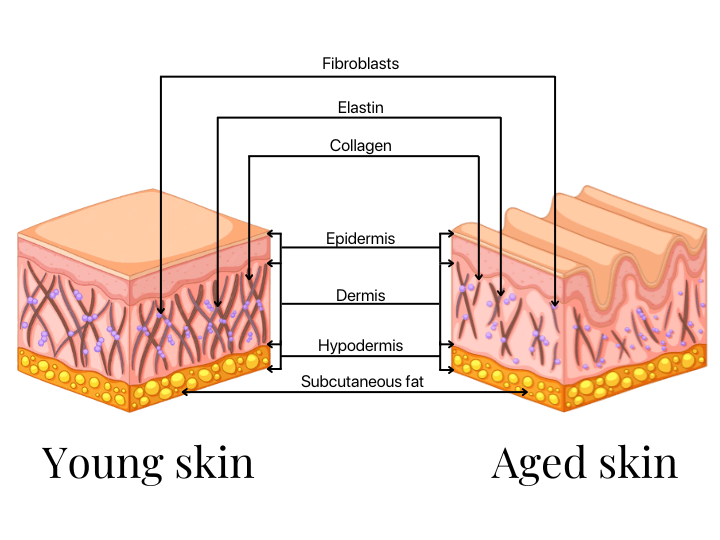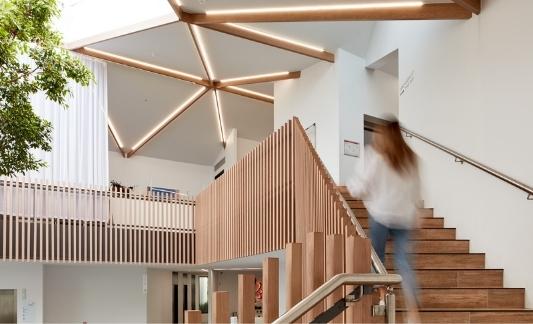Collagen Stimulation and Remodelling Treatment Melbourne
Collagen-stimulating treatments and products may improve the skin’s general appearance and firmness. As people age, collagen production decreases, leading to wrinkles, fine lines, and a loss of elasticity.
What is collagen?
Collagen is a protein that plays a crucial role in the health and appearance of the skin. It is the main structural component of the skin (and other connective tissues, such as tendons, ligaments, and cartilage). The body produces collagen naturally, and it is responsible for giving the skin strength, elasticity, and firmness. Collagen is made from amino acids, the most abundant of which is glycine.
Fibroblasts are the cells in the skin that produce collagen. They are found in the deeper layers of the skin, called the dermis. They produce collagen fibres, which are then arranged in a specific way to form a network that gives the skin its strength and elasticity.
Collagen remodelling
Collagen remodelling, or tissue remodelling, is a dynamic process that involves restructuring and renewing skin tissues to maintain or improve their structural integrity and function. Collagen, a key protein in the skin, provides strength and elasticity, but as we age, collagen production decreases, leading to wrinkles, sagging, and loss of firmness.
Collagen remodelling aims to stimulate the skin’s natural ability to produce new collagen and break down old or damaged fibres. This process can be triggered by various treatments which create controlled micro-injuries in the skin, such as:
- In-clinic medical procedures
- Polynucleotide treatment
- Laser
- Microneedling / Skin Needling
- Topical retinoids
- Radiofrequency Needling
- IPL Skin Rejuvenation
- Chemical Peels
These micro-injuries activate the body’s healing response, increasing collagen synthesis and improving skin texture and elasticity. By promoting the regeneration of collagen fibres, tissue remodelling helps to reduce the signs of ageing and enhance overall skin health.

Treatments to stimulate collagen production
Before undergoing any treatment, a medical consultation is required to evaluate your skin and create a personalised treatment plan. During your consultation:
- We will take a detailed medical history.
- Your facial skin will be thoroughly examined, assessing factors such as skin laxity, volume loss, texture, and wrinkles or lines.
- Standardised clinical photos and videos of your face will be taken, and a VISIA skin analysis will be performed.
- A treatment plan, including costs, will be provided, and you’ll have adequate time to consider it before proceeding.
- An explanation of the proposed treatment will be given.
- The risks and benefits of the treatment will be explained, and a consent form must be completed before treatment begins.
Consultations for collagen stimulating and remodelling treatments are available with doctors at our Lower Templestowe and Berwick clinics.
How to stimulate collagen production in your skin
Rejuran
Comprised of Polynucleotides extracted from salmon DNA, Rejuran stimulates collagen production and rejuvenates the skin by triggering the skin’s regenerative mechanisms in the upper layers. Rejuran enhances the production of collagen and elastin for overall skin rejuvenation, targeting concerns like fine lines, wrinkles, and uneven skin texture.
In-clinic medical procedures
Cosmetic medical procedures to increase collagen production and hydration in the skin are procedures performed by medical practitioners in a clinical setting. The procedure involves introducing a product into the skin, which triggers the natural healing response and collagen production. Over the following weeks, new collagen and elastin fibres are produced, resulting in a thicker and more elastic skin. This collagen production helps to improve the skin’s elasticity, reduce wrinkles and fine lines, and restore volume and fullness to the skin.
IPL skin rejuvenation
IPL (Intense Pulsed Light) treatment stimulates collagen production by delivering light energy to the skin. The light energy heats the deep layers of the skin, which triggers the skin’s natural healing response and stimulates the production of new collagen and elastin fibres. This increased collagen production can help improve the skin’s texture and tone, reduce wrinkles and fine lines, and restore a more youthful appearance.
Radiofrequency (RF) Needling
RF needling treatment combines skin needling with radiofrequency energy. Radiofrequency energy heats the dermis to trigger collagen production, immediately tightening and shrinking the treated area. This jumpstarts the skin’s natural healing process, increasing elastin and collagen production.
Topical retinoids
Vitamin A skin care products, such as retinoids, stimulate collagen production by increasing cell turnover and promoting the production of new cells in the skin. They also help to increase the production of collagen and elastin fibres, the proteins that give the skin strength and elasticity. Vitamin A-based products can help reduce wrinkles and fine lines, improve skin texture and tone, and enhance the overall health and appearance of the skin.
Chemical peels
Chemical peels containing AHA (alpha hydroxy acid), Retinoic acid, BHA (beta hydroxy acid) or Trichloroacetic acid increase collagen production. Chemical peels are a method of regenerating and resurfacing the skin by inducing a controlled wound. They remove the top layer of skin to help induce collagen remodelling and, therefore, improve sun-damaged skin, skin pigmentation problems, wrinkles, skin texture, and the overall appearance of the skin. The new cells are rich in collagen and elastin fibres, increasing the skin’s strength and elasticity, reducing wrinkles and fine lines, and improving skin texture, tone and overall appearance.
Sunscreen
Sunscreen helps prevent collagen loss by blocking harmful UV rays that can damage the skin’s collagen fibres. When UV rays penetrate the skin, they can cause inflammation and oxidative stress, leading to collagen and elastin fibre breakdown. By protecting the skin from UV damage, sunscreen helps preserve the integrity of these fibres, preventing collagen loss.
Why is collagen stimulation important?
When collagen is abundant in the skin, it provides a plump, hydrated appearance. As a structural component of the skin, collagen helps it remain elastic and prevents sagging. Furthermore, it plays an important role in wound healing by helping to repair damaged skin tissue. Collagen also helps to protect the skin from damage caused by UV radiation, pollution, and other environmental factors. Overall, collagen is an essential skin component that helps maintain a healthy, youthful appearance.
The production of collagen decreases as we age, leading to wrinkles, fine lines, and a loss of elasticity in the skin; this is why it’s important to stimulate and boost collagen production to maintain a youthful, healthy and radiant appearance.
What causes collagen loss?
Collagen loss in the skin can be caused by a variety of factors. Some of the most common causes include:
- Ageing: As we age, the body’s natural collagen production begins to slow down, leading to a gradual loss of collagen in the skin.
- UV damage: Sun exposure can cause damage to the skin’s collagen fibres, leading to a loss of elasticity and an increase in wrinkles and fine lines.
- Environmental toxins: Exposure to pollutants and other toxins can cause damage to the skin’s collagen fibres, leading to a loss of elasticity and an increase in wrinkles and fine lines.
- Inflammation: Inflammation caused by chronic skin conditions such as acne, rosacea, and eczema can also lead to collagen loss.
- Lifestyle factors: Poor diet, lack of physical activity, smoking, and excessive alcohol consumption can all contribute to collagen loss.
- Hormonal changes: Hormonal changes due to pregnancy, menopause, and certain medical conditions can also lead to collagen loss.
It’s important to note that any factors that cause inflammation can damage collagen in the skin, which then affects the skin’s ability to repair and regenerate. Therefore, it’s essential to take care of your skin, maintain a healthy lifestyle and use skin care products to support and boost collagen production and prevent collagen loss.
FAQs
What is collagen stimulation and remodelling?
Collagen remodelling is the process by which the skin’s structure is renewed and strengthened through the breakdown of old collagen fibres and the production of new ones. This process stimulates the production of collagen to improve or maintain the skin’s firmness, elasticity, and overall health.
How long does collagen remodelling take?
Collagen remodelling commences 2 to 3 weeks after the controlled micro-injuries to the skin and continues for months or up to one year.
How many collagen stimulation treatments will I need?
The number of collagen stimulation treatments you’ll need can vary based on several factors, including the specific treatment method, your skin’s current condition, and your desired results. Typically, patients may require anywhere from 3 to 6 sessions, spaced several weeks apart, to achieve optimal results. For example, microneedling often requires multiple sessions for significant improvement, while treatments like radiofrequency needling or laser might offer noticeable results in fewer sessions. During a consultation, your practitioner will assess your skin type and concerns to recommend a personalised treatment plan. Maintenance treatments may also be suggested to sustain and enhance the results over time.
What areas of the face show signs of collagen loss?
Collagen loss in the face typically manifests as reduced skin elasticity, volume loss, and the appearance of fine lines and wrinkles. Here are some key areas where collagen loss is often noticeable:
- Forehead: Fine lines and wrinkles can form as collagen diminishes, causing the skin to lose firmness.
- Cheeks: Collagen depletion can lead to sagging skin and a loss of volume, resulting in a sunken appearance.
- Eyes: The area around the eyes is delicate and shows early signs of collagen loss, such as lines extending from the outer corners and under-eye hollows.
- Lower Face: Decreased collagen can cause lines around the mouth and loss of skin laxity along the jawline and chin.
- Frown Lines: Collagen depletion in the area between the eyebrows can lead to the development of vertical frown lines.
Where to get collagen stimulating treatments in Melbourne?
At Victorian Cosmetic Institute we have a variety of collagen stimulating treatment options available. We also have a wide range of skin care products that are specially formulated to nourish and protect the skin, to support collagen production and promote healthy skin.
Our team of Cosmetic Doctors, Nurses and Skin Therapists will work with you to develop a personalised treatment plan that is tailored to your individual needs and goals. Phone our friendly Customer Care team on 1300 862 824 or book your consultation online.
Last updated July 2024
